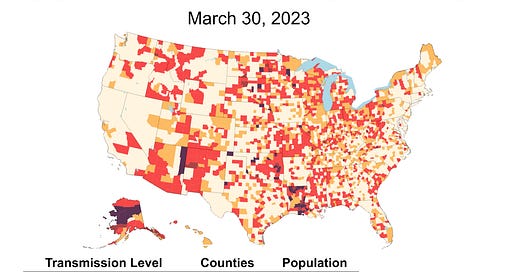The Weather: Over half of all counties in the country are still experiencing substantial or higher transmission levels.
Wins:
Quietly, many COVID-impact-aware folks are holding consciousness-raising and solidarity-building events (like this one with workers and students), taking steps towards a mode of society able to durably meet all needs: immediate, directly health-related, and otherwise.
In Illinois, the state legislature in the House voted 68 to 35 in favor of better indoor air quality at school systems to require the equipping of portable air cleaners and air quality monitors in all shared spaces.
Variants:
This week, Kraken (XBB.1.5) makes up 87.9% of cases, which is a slight decrease from last week’s Weather Report. A new subvariant of XBB is emerging and growing in proportion, XBB.1.9.1 (Hyperion) at 4.6% of cases, up from 3.3% of cases last week.

Across different regions, the Mountain states and parts of the Midwest are observing a growing percent of cases of Hyperion of greater than 5 percent. Other parts of the country remain at less than 5 percent of all detected variants. In the next few months, we will see whether Hyperion becomes a dominant variant.

Wastewater Monitoring:
Wastewater levels on average appear to be rising again in all four regions after having dropped across the country.

If you zoom in to specific counties, you’ll find more variation in how wastewater levels are trending. Some places are seeing larger surges in wastewater levels than other locations. This tells us that the national trend is not the end-all-be-all – please check your county’s wastewater levels too!
Hospitalizations:
Hospitalizations for confirmed COVID cases remain high at national rates of 3.45 per 100,000 for ages 70+ and 0.7 per 100,000 for all ages as of March 29.
Access to Care:
As discussed in a previous Weather Report, 15 million Americans are at risk of losing their Medicaid coverage with the end of the Public Health Emergency in May.
The continuous coverage provision – which prevented states from disenrolling Medicaid recipients and did not require annual recertification – ended on March 31st at midnight, and five states moved to immediately revoke people’s coverage, pending recertification. As of April 1, residents of Arizona, Arkansas, Idaho, New Hampshire and South Dakota will be the first to potentially lose coverage, followed by 14 more states in May and 20 additional states plus the District of Columbia in June. Others will take 14 months given by the federal government to complete their coverage redeterminations.
As Long COVID Justice Network has discussed, as is so often the case, these changes will disproportionately hurt houseless people, disabled people, and people of color as each state reevaluates the Medicaid eligibility of everyone on their rolls. And we know that these same populations likely have high rates of Long COVID.
Protections:
The risk of infection in healthcare settings remains high. Disability Rights California opposes the California Department of Public Health updated guidance that ends mask requirements on April 3, 2023, in health care settings. In the UK, from 2020 to 2022, nearly 14,000 individuals died as a result of a hospital-acquired COVID infection.
Deaths:
The week of March 29, 2023, 1,596 people died of COVID nationally. At least 1,125,366 people have in total died from COVID in the US. Deaths for the past week may be even larger due to incomplete data from processing delays for Delaware, Florida, and Mississippi.
Significant disparities persist, a study by the Morehouse School of Medicine showed that from 2020 to 2021, Black children died from COVID at a rate 3 times higher than White children.
Long COVID:
The FDA is seeking public feedback on patient-focused drug development for Long COVID with a virtual meeting. Send your comments and register for this event on April 25th, 10 am to 4 pm.
Take Action:
Public Health Emergency:
Tell the Biden Administration to extend the Public Health Emergency (by US Health and Human Services) beyond May 11th, and to veto the recently passed Congressional bill, H.J. Resolution 7, in which ends the Administration’s National Emergency of the COVID pandemic, once signed by Joe Biden.
The end of the Public Health Emergency eliminates no-cost COVID rapid tests, COVID vaccines, and on-site COVID testing. It also prevents access to many behavioral health prescription medications through an initial telemedicine visit. Medicare Part D will reduce the extended 90 day supply of prescription medications to 30 days.
The end of the National Emergency leads to the end of full coverage for out-of-network services with Medicare Advantage. For those eligible for health insurance through COBRA because of an employment layoff, this is the end of extensions and shortens deadlines. This also eliminates deadline extensions to file for claims toward their flexible spending accounts (FSAs) and health reimbursement arrangements (HSAs).
Send your letter to the White House and other political leaders voicing your concern and that the pandemic is not over!
Clean Air:
Support efforts for clean air inside the classroom in Illinois with your advocacy of the Clean Air for Healthy Equitable Schools Act (HB3713) and sign the petition. Encourage Illinois legislators to VOTE YES on this initiative! Our teachers and students deserve to work/learn in schools that meet expert recommendations for clean air!
Masking:
Our medical facilities are one of the last safe havens where universal masking remains, protecting us from COVID during healthcare appointments. This is why it is especially malicious that many states are removing universal masking in healthcare settings. Email and call your health department as well as your healthcare system leadership to maintain universal masking using our letter template.
Notes: 1) The numbers in this report were current as of 3/30/23. The CDC updates data frequently as it receives refreshed information. Today’s numbers may be slightly different from the data here. 2) Check out the links throughout & see our website for more - https://peoplescdc.org





